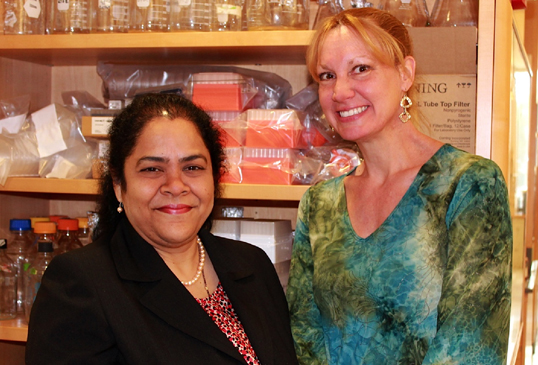
Alcohol research expert Pranoti Mandrekar, PhD (left), and cancer researcher and clinician JeanMarie Houghton, MD, PhD, have been awarded a grant from the National Institute of Alcohol Abuse and Alcoholism to establish a mechanistic link between alcohol consumption and human breast cancer.
Women who regularly consume alcohol increase their chances of developing breast cancer by 50 percent, a link that has been well established by epidemiological studies. Now, two UMass Medical School researchers are collaborating using a unique in vivo model system to better understand how alcohol consumption affects breast cancer initiation, growth and aggressiveness.
Alcohol research expert Pranoti Mandrekar, PhD, and cancer researcher and clinician JeanMarie Houghton, MD, PhD, have been awarded an exploratory and developmental grant from the National Institute of Alcohol Abuse and Alcoholism to establish a mechanistic link between alcohol consumption and human breast cancer. This collaborative project combines the strengths of two senior investigators leveraging powerful UMMS resources: the UMass Cancer Center Tissue Bank and the Humanized Mouse Core.
“This study investigates the effect of alcohol consumption on the growth and aggressiveness of patient-derived breast cancers in a novel in vivo mouse model,” said NIAAA Program Officer Philip Brooks, PhD. “The project brings together basic and clinical researchers who are experts from different fields.”
With the association of alcohol consumption and increased breast cancer risk well established, Dr. Mandrekar, associate professor of medicine, and Dr. Houghton, associate professor of medicine and cancer biology, have set out to uncover the molecular basis of this risk, which will allow scientifically validated recommendations regarding drinking and women’s health. They believe that alcohol consumption by women—of more than two drinks per day—causes an inflammatory response in breast tissue that can lead to cancer, worsen previously diagnosed cancer, hinder treatment and hasten recurrence.
The central hypothesis of this grant is that alcohol directly—via activation of stress induced heat shock proteins—orchestrates an inflammatory microenvironment conducive to initiation and progression of human breast cancer in vivo. To test this, they will use a combination of in vitro cell culture studies and a novel mouse model of human breast cancer to determine the effects of chronic alcohol consumption on human cancer growth, progression and metastasis.
While current guidelines suggest that women limit daily alcohol consumption to no more than two drinks per day and that this level of consumption is protective of cardiovascular health, the link between alcohol consumption and breast cancer suggests otherwise. Preliminary studies conducted by Mandrekar and Houghton show that breast cancer cells grow rapidly in response to physiological concentrations of alcohol. “Once we know what pathways are activated or suppressed, those pathways can be targeted,” said Mandrekar.
Mandrekar and Houghton are enthusiastic that the grant gives them the opportunity to involve other UMMS colleagues who have particular expertise that makes this research project feasible. They are collaborating with world-renowned diabetes researcher Dale Greiner, PhD, the Dr. Eileen L. Berman and Mr. Stanley I. Berman Foundation Chair in Biomedical Research and professor of molecular medicine. Dr. Greiner pioneered the creation of the humanized mouse, an immunodeficient mouse model that readily accepts the growth of human tissue, including tumors. “Equally exciting is the future opportunity to apply this knowledge to other cancers which have a link to alcohol consumption, notably cancers of the gastrointestinal tract and liver,” said Mandrekar.
“The threshold for the alcohol consumption–breast cancer risk in women is much lower than it is for cardiovascular risk, but physicians are not talking with their patients about this,” said Houghton. “We’re in the unique position to leverage strong clinical expertise with the exceptional resources of our basic science collaborators and possibly impact how women think about alcohol consumption in relation to breast cancer risk and how physicians talk with women about reducing that risk.”